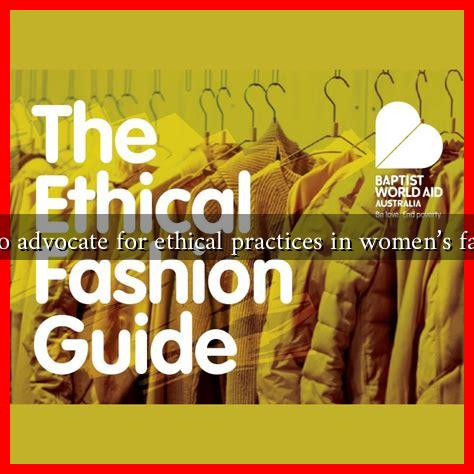-
Table of Contents
- How to Advocate for Ethical Practices in Women’s Fashion
- Understanding Ethical Fashion
- Why Advocate for Ethical Practices?
- Strategies for Advocacy
- 1. Educate Yourself and Others
- 2. Support Ethical Brands
- 3. Use Social Media as a Platform
- 4. Organize Community Events
- Case Studies: Successful Advocacy in Action
- Conclusion
How to Advocate for Ethical Practices in Women’s Fashion
The fashion industry is a powerful force that shapes culture, identity, and self-expression. However, it is also notorious for its ethical dilemmas, including labor exploitation, environmental degradation, and cultural appropriation. As consumers become more aware of these issues, advocating for ethical practices in women’s fashion has never been more crucial. This article explores effective strategies for promoting ethical fashion, highlighting the importance of consumer awareness, sustainable practices, and community engagement.
Understanding Ethical Fashion
Ethical fashion refers to clothing that is produced in a way that is socially responsible and environmentally sustainable. This includes fair labor practices, eco-friendly materials, and transparent supply chains. According to a report by the Ethical Fashion Forum, the global fashion industry is worth over $2.5 trillion, yet it is also responsible for significant environmental harm and human rights violations.
Why Advocate for Ethical Practices?
Advocating for ethical practices in women’s fashion is essential for several reasons:
- Human Rights: Many garment workers face poor working conditions, low wages, and exploitation. Advocating for ethical practices helps protect their rights.
- Environmental Impact: The fashion industry is one of the largest polluters in the world. Sustainable practices can significantly reduce this impact.
- Consumer Awareness: Educating consumers about the implications of their purchases can lead to more informed choices.
Strategies for Advocacy
Here are some effective strategies to advocate for ethical practices in women’s fashion:
1. Educate Yourself and Others
Knowledge is power. Understanding the complexities of the fashion industry allows you to engage in informed discussions. Consider the following:
- Read books and articles on ethical fashion, such as “Fashionopolis: The Price of Fast Fashion and the Future of Clothes” by Dana Thomas.
- Follow organizations like the Ethical Fashion Initiative and Fashion Revolution for updates and resources.
- Attend workshops and seminars focused on sustainable fashion.
2. Support Ethical Brands
One of the most direct ways to advocate for ethical practices is to support brands that prioritize sustainability and fair labor. Look for:
- Brands that use organic or recycled materials.
- Companies that are transparent about their supply chains.
- Labels that are certified by organizations like Fair Trade or GOTS (Global Organic Textile Standard).
For example, brands like Reformation and Everlane are known for their commitment to ethical practices and transparency.
3. Use Social Media as a Platform
Social media is a powerful tool for advocacy. Here’s how you can leverage it:
- Share information about ethical fashion brands and practices on platforms like Instagram and Twitter.
- Use hashtags such as #WhoMadeMyClothes and #EthicalFashion to raise awareness.
- Engage with influencers who promote sustainable fashion.
4. Organize Community Events
Bringing people together can amplify your message. Consider organizing:
- Clothing swaps to promote reusing and recycling.
- Workshops on sustainable fashion practices.
- Panel discussions featuring experts in ethical fashion.
Case Studies: Successful Advocacy in Action
Several organizations and movements have successfully advocated for ethical practices in fashion:
- Fashion Revolution: This global movement encourages consumers to ask brands, “Who made my clothes?” and promotes transparency in the fashion supply chain.
- Good On You: An app that rates fashion brands based on their ethical practices, helping consumers make informed choices.
Conclusion
Advocating for ethical practices in women’s fashion is a multifaceted endeavor that requires education, community engagement, and consumer action. By understanding the issues, supporting ethical brands, utilizing social media, and organizing community events, individuals can make a significant impact. As consumers become more conscious of their choices, the fashion industry can evolve towards a more sustainable and equitable future. Together, we can champion ethical practices that not only benefit workers and the environment but also enrich our own lives through mindful consumption.
For more information on ethical fashion, visit Fashion Revolution.


